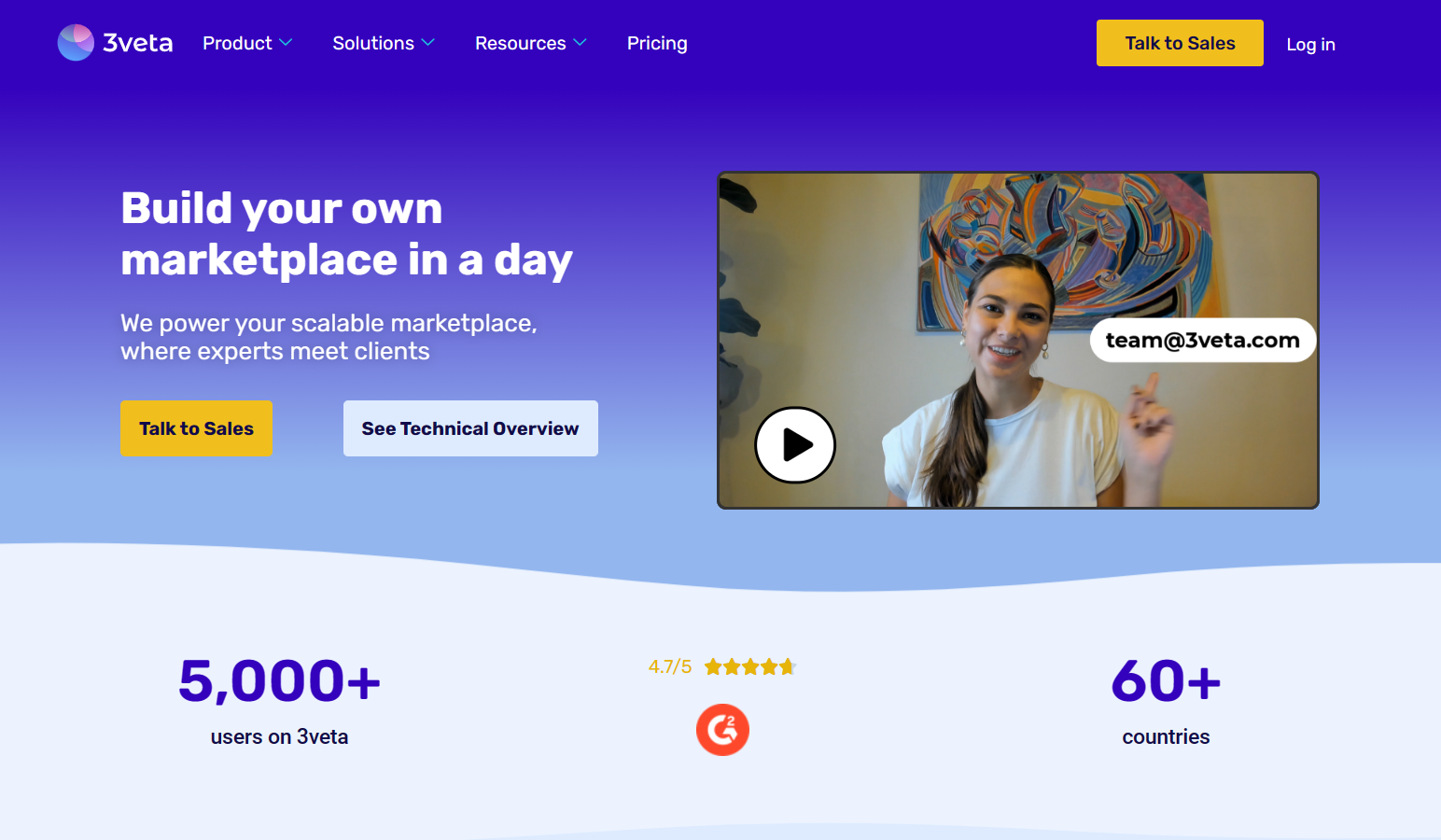The shift of teachers and students to a web-based classroom instead of a physical one started a few years ago.
However, the pandemic, together with the technological advancements and the new emerging learning tools, further accelerated the process.
Nowadays, students, professionals, and tutors prefer to get together on virtual apps as online learning turned out to be just as efficient as offline classes, if not more.
The convenience of studying and working from home is at the foundation of many successful online tutoring businesses.
In this article, we take a look at the details every entrepreneur should know before building an online tutoring marketplace.
Table of contents
What is a tutoring marketplace?
To explain how the online tutoring market works, we ought to go over the basic functions of every service marketplace.
Service marketplaces gather service providers and service-seekers together on a platform that handles the arrangement, execution, and successful payment for every deal between sellers and customers.
So, an online tutoring marketplace allows teachers to offer their services to a greater audience and easily get booked while students’ access to quality education is extremely facilitated.

As an entrepreneur you’d want to make revenue by making the interaction between teachers and students easier, thus, you’ll have to consider the most appropriate tutoring marketplace business model.
Usually, tutoring websites rely on commissions or subscriptions in order to make money.
The former means that every time there is a successful exchange of a service for money, the marketplace takes a small percentage or fee.
The latter, on the other hand, requires all members to subscribe and pay a fixed rate on a weekly/monthly/yearly basis.
The best way to pick a business model is to consider not only the nature of the services your marketplace would offer but also the audience you’d be targeting.
Who is the target market for online tutoring?
Your online tutoring business could be targeting different fields of education.
There are high school tutors who help students manage the workload, especially since the COVID-19 crisis challenged the way schools used to operate.
Subject tutoring allows students to seek help for the more challenging classes and it could be short-term or long-term depending on the needs of the students.

Supplemental instruction, on the other hand, comes as an addition to regular classes and helps students acquire new skills and explore other fields of study.
Also, there is tutoring for professionals which consists of an intensive workload that concludes in a couple of months with an examination and a diploma. These are usually completed by professionals who seek further development in their careers.
Your online tutoring marketplace could be offering a variety of classes, however, you’ll have to pick a niche to focus on – kindergarteners, middle or high schoolers, college and university students, professionals, or people who seek to add something more to their BS and MS degrees.
Is there a demand for online tutors?
Every person that wants to open a tutoring business online might be wondering if there is still a demand for online tutors.
Doubts such as ‘the online tutoring market might already be saturated’ and ‘people might prefer to learn in person’ are probably troubling you.
Rest assured, there is still an increasing demand for online tutors. According to an online tutoring market analysis report, the global online tutoring services market size was valued at USD 6.57 billion in 2021 and is expected to grow at a compound annual growth rate (CAGR) of 14.7% from 2022 to 2030.

One of the first steps you need to take to create a tutoring website is to research the trending subjects from the educational niche you’ve chosen; what are students in need of?
We’ll explain the rest of the steps by highlighting what you should NOT do.
Mistakes you should avoid when building a marketplace
It is easy to explain how to build a tutoring business in a few steps, however, we believe that it might be more useful to start with the most common mistakes that one should avoid.
Not thinking about tutors’ experience
Tutors may be good and knowledgeable in their field, but that doesn’t mean they are necessarily tech-savvy.
That is why having a trouble-free online tutoring platform that is easy to use and intuitive is crucial.
Video calls, scheduling, and payments are just a few features worth mentioning.
💡 Pro tip
The best way to make sure you serve both sides of the marketplace is by providing quality end-to-end service. To achieve that, choose a marketplace builder that comes with all the features your users might need.

Not establishing rules
Every business has its rulebook and your online tutoring business shouldn’t be an exception.
Make sure to establish clear policies for both tutors and clients to abide by.
For example: What happens if someone is not happy with their purchase; do they receive a refund and in what cases?
Also, marketplaces shouldn’t be all about quantity, you should come up with the criteria for registering tutors to decrease the chance of customers issuing a complaint.
Not having a business model
As mentioned above, there are various types of tutoring marketplace business models.
Make sure to get acquainted with how each one of them works and weigh the pros and cons of each one for the particular needs of your business.
This way you’ll take the most out of each successful deal, grow, and eventually expand the reach and scope of your marketplace.
Not promoting trust on the platform
Trust is the most essential aspect of a service marketplace.
Similarly to the controversial origin of the chicken and the egg, attracting tutors and students to your marketplace could be just as confusing.
Which one comes first?
To be seen as a good solution to the working-from-home issues tutors usually face, you should have a clear business model, plan, and strategy.

You have to advertise yourself as a trustworthy and time-saving marketplace alternative to the idea of building a platform for their services which tutors might also be considering.
After that, allow customers to share their experiences by sending out evaluation forms or including a review section.
Not finding the right marketplace builder
Finally, you have to build the marketplace according to the features you want to include.
If you have certain programming skills, you may want to hire a team of experts that could help you build the whole thing from scratch.
However, this could be quite pricey and time-consuming. Our advice is to consider using 3veta’s marketplace builder which can do the whole job for you in accordance with your demands and goals.
To sum it up
Creating an online tutoring marketplace is a good idea as research shows that the demand for online tutors is increasing, even though schools are going back to the normal in-person environment.
However, you need to consider details such as the marketplace niche you want to focus on, the business model of your marketplace, the features needed, and the tool you’ll use as a marketplace builder.
Don’t forget that building trust between you, the service provider, and the service-seeker is one of the top essentials so that your business venture can become successful!
